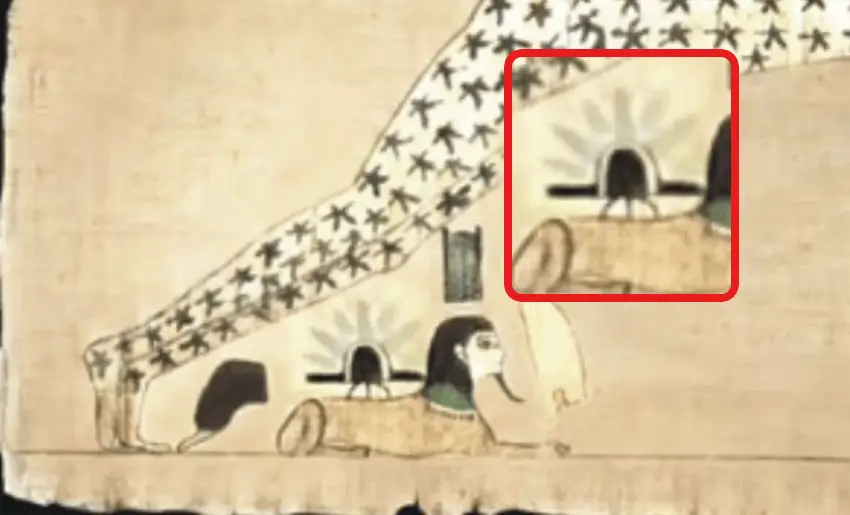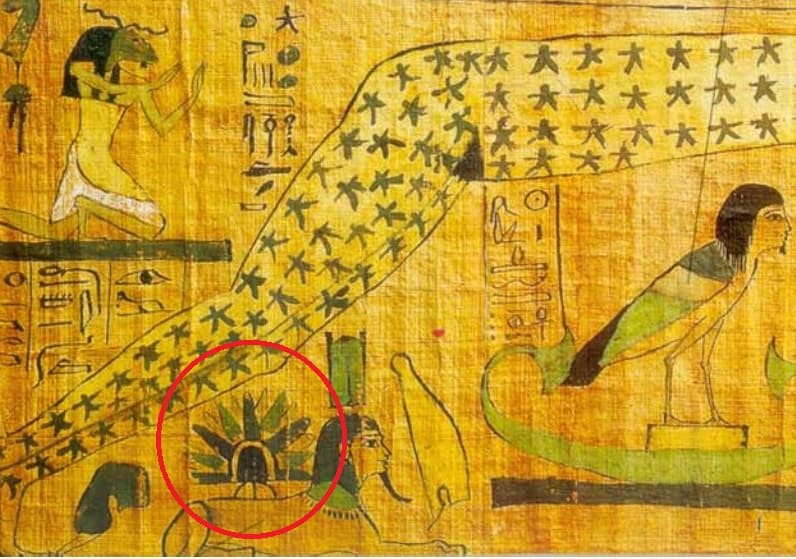A 3000-year-old Egyptian Papyrus Showing UFOs discovered in Cairo
The enigmatic 3,000-year-old vignette from the Djedkhonsuiefankh funerary papyrus found on display in the Cairo Museum illustrates an uncanny scene: a disc-shaped object, depicted as being extremely bright, with a landing gear deployed on top of a Sphinx.
Could this really be an alien UFO?
Alien hunters believe this is the ultimate evidence there is a deep connection between Ancient Egypt and otherworldly beings.
The object seen on top of the Sphinx is unlike any other “boat“ seen in ancient Egyptian mythology.
In fact, it’s unlike anything previously seen in their iconography or symbolism.

There are similar depictions of alleged flying machines at the temple of Seti I, but these have been debunked as being the result of palimpsest.
The curious object seen in the vignette from the Djedkhonsuiefankh funerary papyrus was painted by the ancients as a Disc that radiates extremely bright light, and when you take a look at modern-day depictions of UFOs, it kinda looks exactly how people would describe a UFO today.
This ancient papyrus—you can see it here—is featured in a study titled: Cosmic Space and Archetypal Time, Depictions of the sky-goddess Nut in three royal tombs of the New Kingdom and the relation to the Milky Way, by Amanda-Alice Maravelia.
And if we take a close look at the ancient manuscript, it’s clear that it is a disc-shaped object which has a radiating dome on top. It is depicted as having ‘landed’ on the Sphinx, with three leg-like tripods seen protruding from the object.
But what makes the Sphinx so special? And what if this really is a UFO—and not a plant or some sort of bug?
Yup, could be a plant-flower, or even some sort of but? Right? What if there is another explanation as to what the object is? I meant just because it looks like a disc-shaped object that’s landed on the Sphinx, doesn’t mean it is one…
The truth is that the origin of the Sphinx is unknown and that doesn’t really help much when you see a papyrus like this one.
The degree of erosion that we see on it suggests it dates back to 10,000 BC. It’s an ancient monument whose secrets have remained hidden for thousands of years.
It is reported that researchers have found passages into hidden chambers beneath the Sphinx and some even venture out and say that the Sphinx may hold the truth behind our very existence.
It is rightfully referred to as one of the most mysterious monuments on the surface of the planet.

When the massive monument was found for the first time, it was covered—up to its head—by sand. For centuries, most visitors and researchers who visited the area believed this was all that existed.
However, French engineer Emile Baraize was convinced that much more lies beneath the surface than even archaeologists were aware of, the reason why he commissioned an excavation to uncover the rest of the Sphinx. Finally, after 11 years of extensive digging, Baraize and his team unearthed a massive body resembling a lion, reintroducing the massive monument to the world in its full splendor. It is the largest monolithic sculpture on Earth.
Curiously, in addition to the above-mentioned papyrus which “illustrates” the disc-shaped object, there is another ancient manuscript considered as the ultimate evidence of alien contact in ancient Egypt.
Called the Tulli Papyrus, the ancient manuscript details an incredible scene.
The translation of the text according to R. Cedric Leonard states:
“In the year 22, of the third month of winter, sixth hour of the day […] among the scribes of the House of Life it was found that a strange Fiery Disk was coming in the sky. It had no head. The breath of its mouth emitted a foul odor. Its body was one rod in length and one rod in width. It had no voice. It came toward His Majesty’s house. Their heart became confused through it, and they fell upon their bellies. They [went] to the king, to report it. His Majesty [ordered that] the scrolls [located] in the House of Life be consulted. His Majesty meditated on all these events which were now going on.
After several days had passed, they became more numerous in the sky than ever. They shined in the sky more than the brightness of the sun, and extended to the limits of the four supports of heaven […] Powerful was the position of the Fiery Disks.
The army of the King looked on, with His Majesty in their midst. It was after the evening meal when the Disks ascended even higher in the sky to the south. Fish and other volatiles rained down from the sky: a marvel never before known since the foundation of the country. And His Majesty caused incense to be brought to appease the heart of Amun-Re, the god of the Two Lands. And it was [ordered] that the event [be recorded for] His Majesty in the Annals of the House of Life [to be remembered] forever.”
Could it be that the enigmatic disk-shaped object on top of the Sphinx is one of those strange Fiery Disk’s mentioned in the Tulli Papyrus?